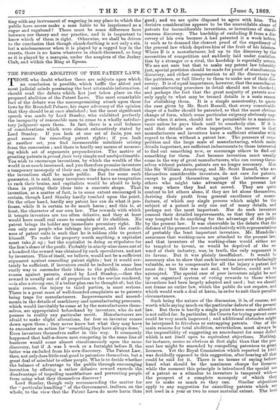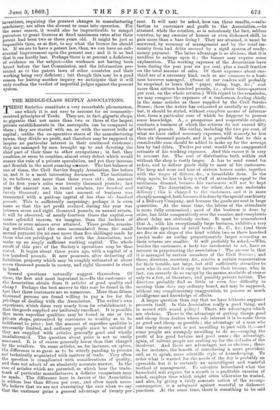THE PROPOSED ABOLITION OF THE PATENT LAWS.
THOSE who doubt whether there are subjects upon which no conclusion is possible, which baffie the ablest and most judicial minds possessing the best attainable information, should read the debate which has just taken place on the proposed abolition of the Patent Laws. The most remarkable fact of the debate was the uncompromising attack upon these laws by Sir Bounden Palmer, his eager advocacy of the opinion that they should be at once abolished ; but the most significant speech was made by Lord Stanley, who exhibited perfectly the incapacity of reasonable men to come to a wholly satisfactory judgment upon them. In fact, there is a real balance of considerations which were almost exhaustively stated by Lord Stanley. If you look at one set of facts, you see good reason for conceding patent rights ; if you look at another set, you find innumerable mischiefs arising from the concession ; and there is hardly any means of measuring which set of arguments preponderates. The motive of granting patents is prima facie very simple and unobjectionable. You wish to encourage inventions, by which the wealth of the world is so much increased, and you therefore promise inventors a temporary monopoly of their use, on the single condition that the inventions shall be made public. But for some such guarantee, it is said, many inventors would have no temptation to rack their brains, and capitalists would be afraid to help them in putting their ideas into a concrete shape. That invention, as a matter of fact, is to some extent encouraged is certain, though Lord Stanley hardly touched upon the point. On the other hand, hardly any patent law can do what it professes, while it is certain to do much harm ; and this is, at least, the character of our own law. The rewards with which it tempts inventors are too often delusive, and they at least would have small real cause to complain of its abolition. No patent brings its holder any immediate pecuniary right. He can only sue people who infringe his patent, and the costliness of patent suits is such that he is seldom able to protect himself. To make the property worth anything, a capitalist must take it up ; but the capitalist in doing so stipulates for the lion's share of the profit. Probably in ninety-nine cases out of a hundred the reward was obtained by such speculators, and not by inventors. This of itself, we believe, would not be a sufficient argument against conceding patent rights ; but it would certainly be sufficient, if inventors could be induced in some less costly way to surrender their ideas to the public. Another reason against patents, stated by Lord Stanley,—that the reward is usually out of all proportion to the service rendered, —is also a strong one, if a better plan can be thought of ; but the main reason, the injury to third parties, is most serious. There is a great mass of well-founded complaints as to patents being traps for manufacturers. Improvements and amendments in the details of machinery and manufacturing processes, which would inevitably be come at by the manufacturers themselves, are appropriated beforehand by inventors, who do not possess in reality any particular merit. Manufacturers are afraid to make slight alterations, for fear an inventor comes down upon them ; they never know but what they may have to encounter an action for "something they have always done." Even inventors themselves suffer in this way. It commonly happened that half-a-dozen men competing in the same line of business would come almost simultaneously upon the same discovery, but if A was n week or a fortnight before B, the latter was excluded from his own discovery. The Patent Law, then, not only does little real good to patentees themselves, but a great deal of mischief to other people. Who is to decide whether the balance of advantage to the public through encouraging invention by offering a rather delusive reward exceeds the disadvantage of impeding manufacture and preventing people from using what they themselves discover ?
Lord Stanley, though only recommending the matter for the " particular handling " of the Government, inclines, on the whole, to the view that the Patent Laws do more harm than gooc); and we are quite disposed to agree with him. The decisive consideration appears to be the unavoidable abase of
patents for inconsiderable inventions, or inventions of siraui_ taneous discovery. The hardship of excluding B from a discovery of his own because A had patented it a week before, is such as to demand the clearest proof of the expediency of the general law which deprives him of the fruit of his labours. Where B is a manufacturer, led up to the discovery by the necessities of competition and suddenly laid under contribution by a stranger or a rival, the hardship is especially severe. We are not sure but that to make any patent law tolerably just, special provision should be made for proof of simultaneous discovery, and either compensation to all the discoverers by the patentees, or full liberty to them to make use of their discovery. It is of equal importance, however, that the amendment of manufacturing processes in detail should not be checked; and perhaps the fact that the great majority of patents now only apply to what may be termed details is a main reason for abolishing them. It is a simple monstrosity, to quote the case given by Mr. Scott Russell, that every conceivable shape of a boiler should be patented, so that the most obvious change of form, which some particular exigency obviously suggests when it arises, should not be permissible to a manufacturer unless he pays black mail to somebody else. If it is said that details are often important, the answer is that manufacturers and inventors have a sufficient stimulus with regard to them without a patent law. The pressure of competition and the large scale of manufacturing, which make details important, are sufficient inducements to those interested to find out something new, or encourage others to find out something for them. Just because invention must usually come in the way of great manufacturers, who can recoup themselves without patents, patents are no longer necessary. Men like Sir William Armstrong, and Mr. Scott Russell, who are themselves considerable inventors, do not care for patents. except to guard themselves against the interference of others who might take advantage of the present law to reap where they had not sowed. They are quite content to let others alone, if they are let alone themselves, deriving their profit from general excellence of manufacture, of which any single process which might be the subject of a patent is only one out of many details, and perhaps not the most important. Nor do such inventors conceal their detailed improvements, so that they are in no way tempted to do anything for the advantage of the public by the present law. It was observable in the debate that the defence of the present law rested exclusively with representatives of probably the least important inventors. Mr. Mundellis assurance that working-men are attached to the present law, and that inventors of the working-class would either not be tempted to invent, or would be deprived of the reward of their industry, was, in truth, the only argument in its favour. But it was plainly insufficient. It would he necessary also to show that such inventions are overwhelmingly valuable, so as to compensate for all the injury a patent law must do ; but this was not and, we believe, could not be altempted. The special case of poor inventors might be met by an organized system of voting rewards to those whose inventions had been largely adopted and used ; but we should not frame an entire law, which the public do not require, and which would work a deal of harm, in order to suit their peculiar circumstances.
Such being the nature of the discussion, it is, of coarse, not worth while saying much on the particular defects of the present law. But there is hardly a single point where some alteration is not called for. In particular, the Courts for trying patent cases could be very much improved ; and additional obstacles might be interposed to frivolous or entrapping patents. One of the main reasons for total abolition, nevertheless, must always be the impossibility of suggesting an amendment for some defect which is not itself open to equivalent objections. Nothing, for instance, seems so obvious at first sight than that the present law might be amended by compelling patentees to grant licences. Yet the Royal Commission which reported in 186a was decidedly opposed to this suggestion, after hearing all that could be said for it. There is no means of saying beforeband what should be the maximum charge for licences, while the moment this principle is introduced the special use of a patent as a stimulus to inventors is tampered with— the prospect of a complete monopoly of which they are to make as much as they can. Similar objections apply to any suggestion for cancelling patents which are not used in a year or two to some material extent. The best
inventions, requiring the greatest changes in manufacturing machinery, are often the slowest to come into operation. For the same reason, it would also be impracticable to compel patentees to grant licences at fixed maximum rates after their patent had been two or three years old. It might be just as impossible then, as at first, to say what the licence fee should be. If we are to have a patent law, then, we can have no substantial improvement upon the present one ; and it is so bad that it can hardly last. Perhaps there is at present a deficiency of evidence on the subject—the workmen not having been heard before the last Commission, and the information presented as to the patent laws of other countries and their working being very deficient ; but though this may be a good reason for having another inquiry we anticipate that it will only confirm the verdict of impartial judges against the present system.































 Previous page
Previous page